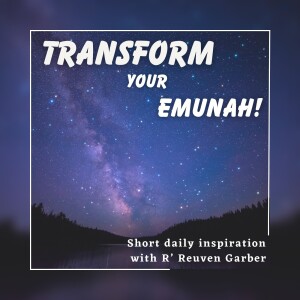
Tuesday May 13, 2025
333 - Pesach Sheini (Part-2)
We discussed the most incredible message that we learn from the day of Pesach Sheni, where people who missed out on the official opportunity to perform the mitzvah of Korban Pesach nevertheless did not give up trying find another way to make up that lost opportunity. And because of their desire to do so, an entire new holy day called Pesach Sheni was created. This message - that we always have a second chance, is one of the most important messages for us to internalize. Hashem created us as human beings, and part of our nature and makeup is that we make mistakes and mess up. One of the greatest gifts that Hashem has given us is the power of teshuva - to be able to rectify what we have done wrong. Sometimes we might make a mistake, unintentionally doing something against what Hashem has commanded us, and at other times, because of our human nature and limitations, we might have even performed a sin against Hashem's will on purpose.
Of course, initially, if we believe in Hashem, we need to make our maximum effort to do what He says to do, and to stay away from what He tells us to stay away from. However, when we have already messed up or performed a sin against Hashem's will, both willingly or by mistake, we need to remember that Hashem Himself designed the world in the way that we always have the opportunity to do teshuva - to return to Hashem and rectify what we did wrong. This most incredible gift of teshuva that Hashem has given us is one of the most fundamental ideas in our service to Hashem for us to internalize.
What is the greatest sin that exists? The Torah commentaries explain that although there are many severe transgressions, and of course, we need to make our maximum effort to not transgress anything Hashem has commanded us to stay away from, however, the biggest transgression of all is the feeling of guilt that we sometimes feel after having messed up, intentionally or unintentionally. Of course, it's not a good thing to transgress, but often what happens is after one has already fallen and transgressed, one falls into a sort of depression, feeling I am not worthy. “How can I, who transgresses, be considered someone worthy to be able to have a personal relationship with Hashem?” Although yesterday maybe I felt like I could talk to Hashem personally, learn Torah, perform mitzvahs and be happy, after transgressing sometimes we could be led to believe that we are not worthy anymore to perform mitzvos, learn Torah or have a personal relationship with Hashem.
The Torah commentaries point out that feeling this form of guilt after transgressing is actually a more serious transgression than the transgression itself. Because when one feels worthy of having a personal relationship with Hashem, one can always find it within themselves to return to Hashem and say, “Hashem, I'm sorry for what I did. I'm going to try better.” Because when one feels worthy, one is able to get up and try again and rectify the situation and move forward in a happy and positive way. Remember, one of the most fundamental principles from the Torah is that there is always a second chance.
No comments yet. Be the first to say something!